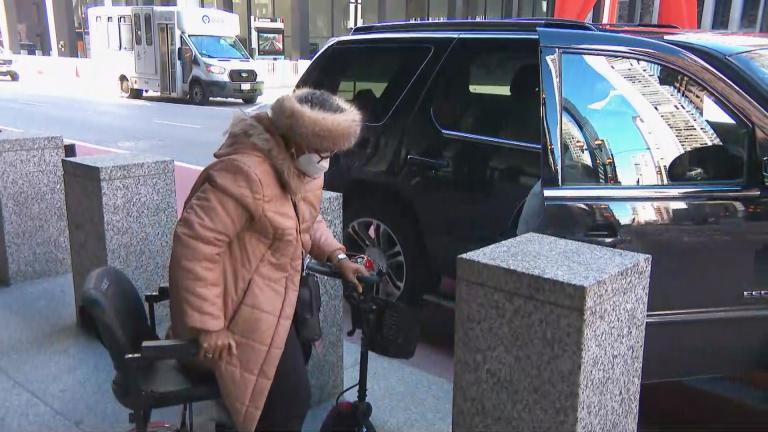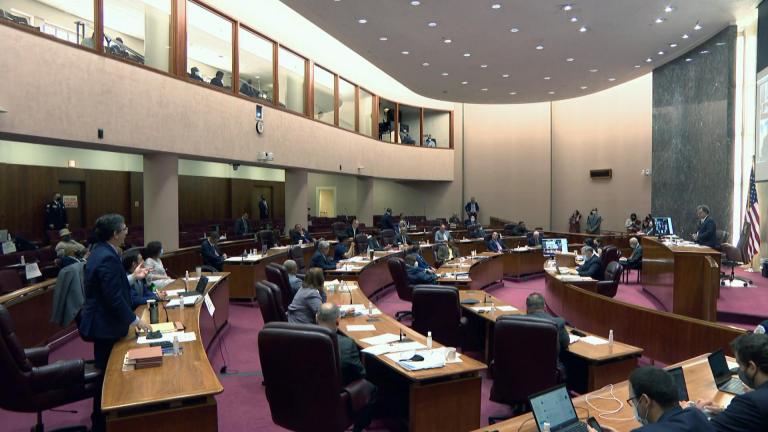Chicago is investigating the demolition Saturday of a former coal plant in Little Village and halting additional work at the site following an uproar over the smokestack’s implosion, which sent a plume of fine powder – debris, dust and other particulate matter — all over the neighborhood.
Mayor Lori Lightfoot on Easter Sunday morning called the incident “outrageous,” and said, “through the power of faith and community we will see this taken care of and addressed so that it never happens again.”
But activists who say they’ve spent 2 1/2 years calling on the city to better protect them say it’s too little, too late, and wonder how much damage has already been done.
“Lightfoot shuts down demolition AFTER devastating dust cloud blankets La Villeta, the jail, and beyond. She should have listened to @LVEJO (Little Village Environmental Justice Organization) leaders and shut it down BEFORE. This never should have happened. Corporate terror during a pandemic. My god,” wrote Grassroots Collaborative director Amisha Patel (@gulabjammin) on twitter.
Lightfoot shuts down demolition AFTER devastating dust cloud blankets La Villeta, the jail, and beyond. She should have listened to @LVEJO leaders and shut it down BEFORE. This never should have happened. Corporate terror during a pandemic. My god. https://t.co/TNdtugwdNj
— amisha patel (@gulabjammin) April 12, 2020
In response to a series of questions about what went on at the site and when, Roberto Perez, CEO of Hilco Redevelopment Partners, whose Chicago-based parent Hilco Global owns the site, said in a statement: “We are working cooperatively with the City of Chicago to review yesterday’s demolition event undertaken by our contractor. We are sensitive to the concerns of the community and we will continue to work in full cooperation.”
In a notice published online in advance of the demolition, Hilco Redevelopment Partners wrote that, “as with all demolition activity, the health and safety of the workers and local community is a top priority. There will be oversight management and extensive dust control and mitigation efforts, including a variety of watering techniques such as water trucks, water cannons and direct-drive misting systems.”
But activists and residents say they had little to no warning — the notice had arrived in email inboxes at 11:59 p.m. Thursday.
“We were floored. Not only are you demolishing one of the most dangerous parts (of the former coal plant), but you’re giving us 24 hours’ notice?” Little Village Environmental Justice Organization director Kim Wasserman said.
Activists had already objected to Hilco’s plans for the site; they’d worked for a dozen years to shut down the coal-fired power plant, and wanted to be sure residents were protected into the future. The Crawford Power Generating Station produced electricity from 1925 until 2012.
Hilco purchased the land in late 2017 with plans to build a warehouse and distribution center branded as “Exchange 55” that’s projected to open sometime this year.
Normally, Wasserman said, her organization would have gone door-to-door to warn neighbors to stay inside during the demolition — to turn off their heat and air conditioners and to close their windows to prevent dust from seeping into their homes. “Not that it’s our job but it’s import to help community members protect themselves,” she said.
“Then you have the added layer of this pandemic so it’s even more difficult,” Wasserman said.
The threat of the coronavirus means it’s no time for volunteers to be blanketing the neighborhood, she said.
Wasserman and other critics also question why the destruction of a smokestack, filed with potentially hazardous chemicals, would go forward during the coronavirus crisis when only “essential” business should be going on, per a statewide executive order. Further, the demolition would be sure to send particulate matter into the air, potentially agitating residents’ lungs in the midst of a global pandemic that can kill with its attacks on the human respiratory system.
Already, the Little Village area ranks as having air quality problems.
Images and videos posted online of the demolition show a murky gray-brown cloud blooming into the sky, then spreading dust across residential blocks like something out of an apocalyptic movie.
“I was on my back yard when this happened, dust all over, not enough notice. If I would have known i would stay inside,” Facebook user Hosea Hrndz wrote in response to Lightfoot’s Sunday morning press conference announcing the city’s response.
Lightfoot on Sunday said that Hilco had the appropriate permits to carry out the demolition, which was supposed to be done in a controlled fashion that would have kept debris confined to the site.
“The city was given repeated assurances that Hilco had a solid plan to contain the dust. Clearly that didn’t happen,” Lightfoot said. “This is absolutely and utterly unacceptable. It’s unsafe, it’s unsanitary. I would not tolerate this in my neighborhood and we’re not going to tolerate it here either.”
Lightfood said Hilco will be cited and fined, and the city will require the company to clean up and remove dust from cars, homes and businesses.
Any other “non-emergency” demolitions, unrelated to Hilco and the Crawford site, will not go forward this week, as the city begins to review its permitting procedures.
And Chicago will also distribute masks to residents near the demolition site.
Wasserman says the mayor needs to do more.
“It seems like the city only learned after its citizens have been impacted, after its citizens have gotten sick,” Wasserman said.
Before the ruckus over the demolition, officials didn’t “excuse my language, give a shit,” she said.
Residents are asking her organization what to do about the dust that’s covering their belongings, but without knowing whether there’s asbestos or other dangerous particles in it, Wasserman said she doesn’t know what to tell them.
“We don’t know what’s in it,” she said.
She wants guidance from the city, air monitors to be installed, and resulting tests from the monitors to be rushed to make sure residents aren’t further exposed to contaminants.
She also said Chicago needs to expand the distribution of masks, including to the nearby Cook County Jail which is a top site nationally for COVID-19 cases.
The Chicago Fire Department was on hand Saturday morning, and posted a video to Twitter with the comment that there was “no problem.”
CFD provided support on demolition of stack at the old Crawford power generation plant near the ship canal and Pulaski now being cleared for new development. Occured at 8 am April 11. No problems pic.twitter.com/0BVpxSjJVt
— Chicago Fire Media (@CFDMedia) April 11, 2020
But on Sunday, CFD spokesman Larry Langford wrote that “the excessive dust caused by yesterday’s demolition of the Crawford smoke stack was unacceptable. CFD is working with CDPH and Buildings to investigate and ensure stronger protocols are taken by companies to keep our residents safe.”
Follow Amanda Vinicky on Twitter: @AmandaVinicky
Note: This story was originally published Sunday. It has been updated to include a “Chicago Tonight” interview with Kim Wasserman.








